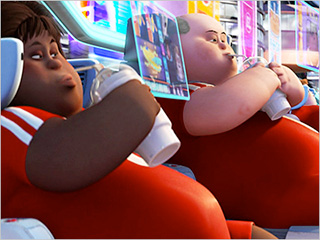Another interesting nuance here is easy technologies versus demanding technologies.
The choice between demanding and easy technologies may be crucial to what we have called technological evolution. We are, as I argued in my most recent piece in this series, self-evolving. We make ourselves into what we, as a species, will become, mainly through our choices as consumers. If you accept these premises, our choice of technological tools becomes all-important; by the logic of biological atrophy, our unused skills and capacities tend to melt away, like the tail of an ape. It may sound overly dramatic, but the use of demanding technologies may actually be important to the future of the human race.
Indeed, I worry about technology because I am not entirely at ease with how technologies seems to determine what it means to be human. I want humans to consciously think about this ongoing redefinition. Whether it is in what we eat, how we meet up with people, how we have sex, I worry a lot, perhaps unnecessarily, that we humans are not thinking through enough.
The problem is that, as every individual task becomes easier, we demand much more of both ourselves and others. Instead of fewer difficult tasks (writing several long letters) we are left with a larger volume of small tasks (writing hundreds of e-mails). We have become plagued by a tyranny of tiny tasks, individually simple but collectively oppressive. And, when every task in life is easy, there remains just one profession left: multitasking.
What then is a demanding technology?
Three elements are defining: it is technology that takes time to master, whose usage is highly occupying, and whose operation includes some real risk of failure. By this measure, a piano is a demanding technology, as is a frying pan, a programming language, or a paintbrush. So-called convenience technologies, in contrast—like instant mashed potatoes or automatic transmissions—usually require little concentrated effort and yield predictable results.
I like automatic transmissions. I have heard from people about how they hate automatic transmission because it makes us passive. It makes us, well, idiots, according to the passionate ones. I hate instant mashed potatoes, and make them from raw potatoes. But, I do thank the technology that has made possible growing potatoes in plenty and bringing them to the store right by my home.
 |
| source, via |
The advantage with demanding technologies is that "they constantly require new learning."
The brain is stimulated and forced to change. Conversely, when things are too easy, as a species we may become like unchallenged schoolchildren, sullen and perpetually dissatisfied.
Why is all this discussion important?
we must take seriously our biological need to be challenged, or face the danger of evolving into creatures whose lives are more productive but also less satisfying.
All those excerpts are from the series of essays that Tim Wu--a law professor at Columbia--has at the New Yorker. In one of those, he writes:
If we’re not careful, our technological evolution will take us toward not a singularity but a sofalarity. That’s a future defined not by an evolution toward superintelligence but by the absence of discomforts.
The sofalarity (pictured memorably in the film “Wall-E”) is not inevitable either. But the prospect of it makes clear that, as a species, we need mechanisms to keep humanity on track. The technology industry, which does so much to define us, has a duty to cater to our more complete selves rather than just our narrow interests. It has both the opportunity and the means to reach for something higher. And, as consumers, we should remember that our collective demands drive our destiny as a species, and define the posthuman condition.
Which is why I am glad there are people growing flowers and vegetables in their yards. Which is why I spend time putting together my own meals, even if only from step 8. Which is why some prefer to buy handmade carpets. We are all, in our own ways, "trying to work out the future of what it means to be human, and, along
the way, trying to find out how to make that existence worthwhile."
2 comments:
Yes, overreliance on technology erodes the brain. Just ask any teenager or most young cashiers to compute a minor maths problem in his head, like making change, and he will be unable.
I'll take my books (paper, please), my puzzles (words, numbers, jigsaw, etc.), and my conversations and happily stimulate my brain, and everyone else can have their technology. I won't even use this technology to determine the meaning of sofalarity.
Speaking of technology, why do I have to prove I'm not a robot again? That step disappeared months ago but is back today.
too many spambots over the last few days ... terrible! so, had to bring back that "robot" test; will reset that if the bots go away in a few days.
Post a Comment